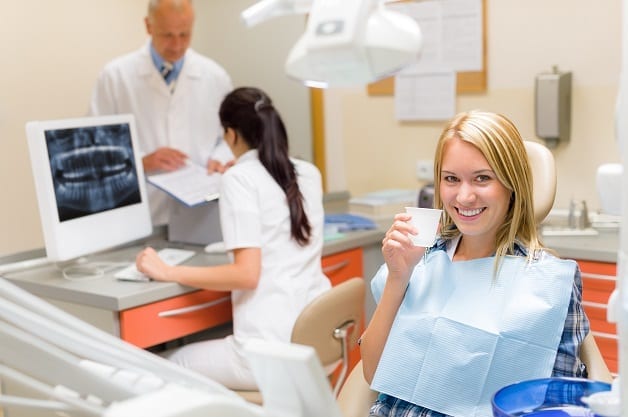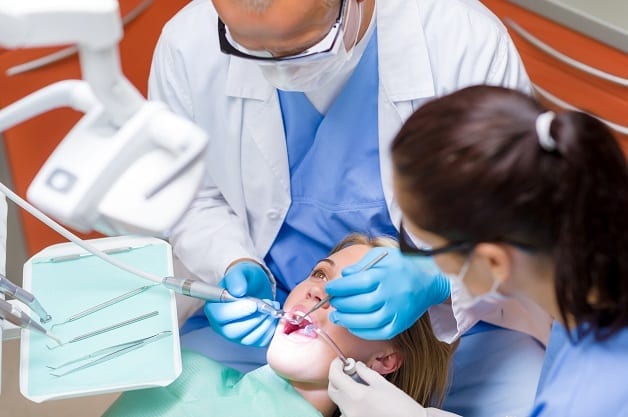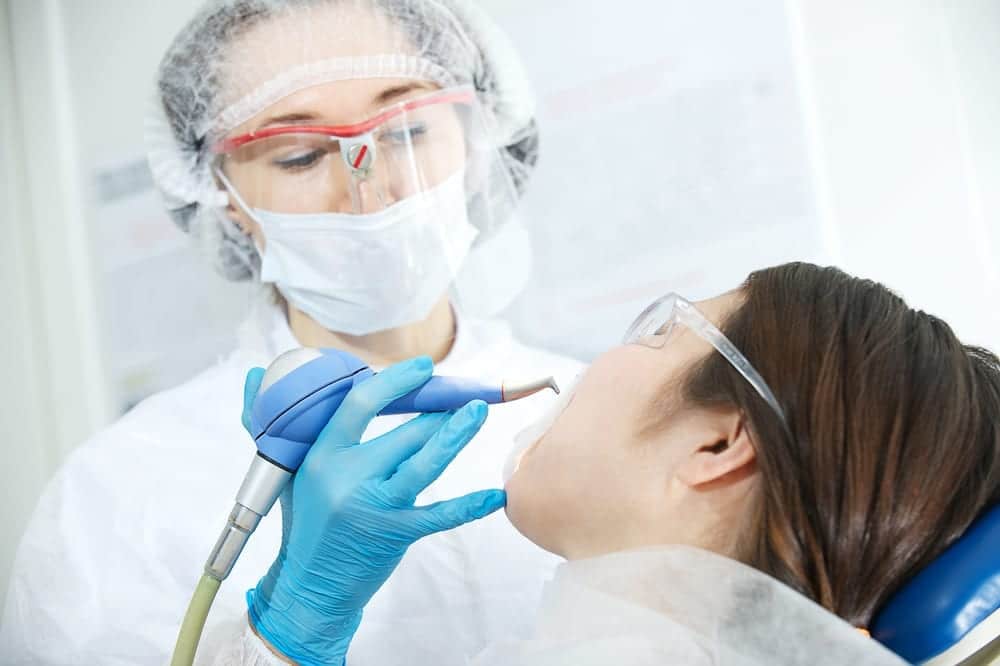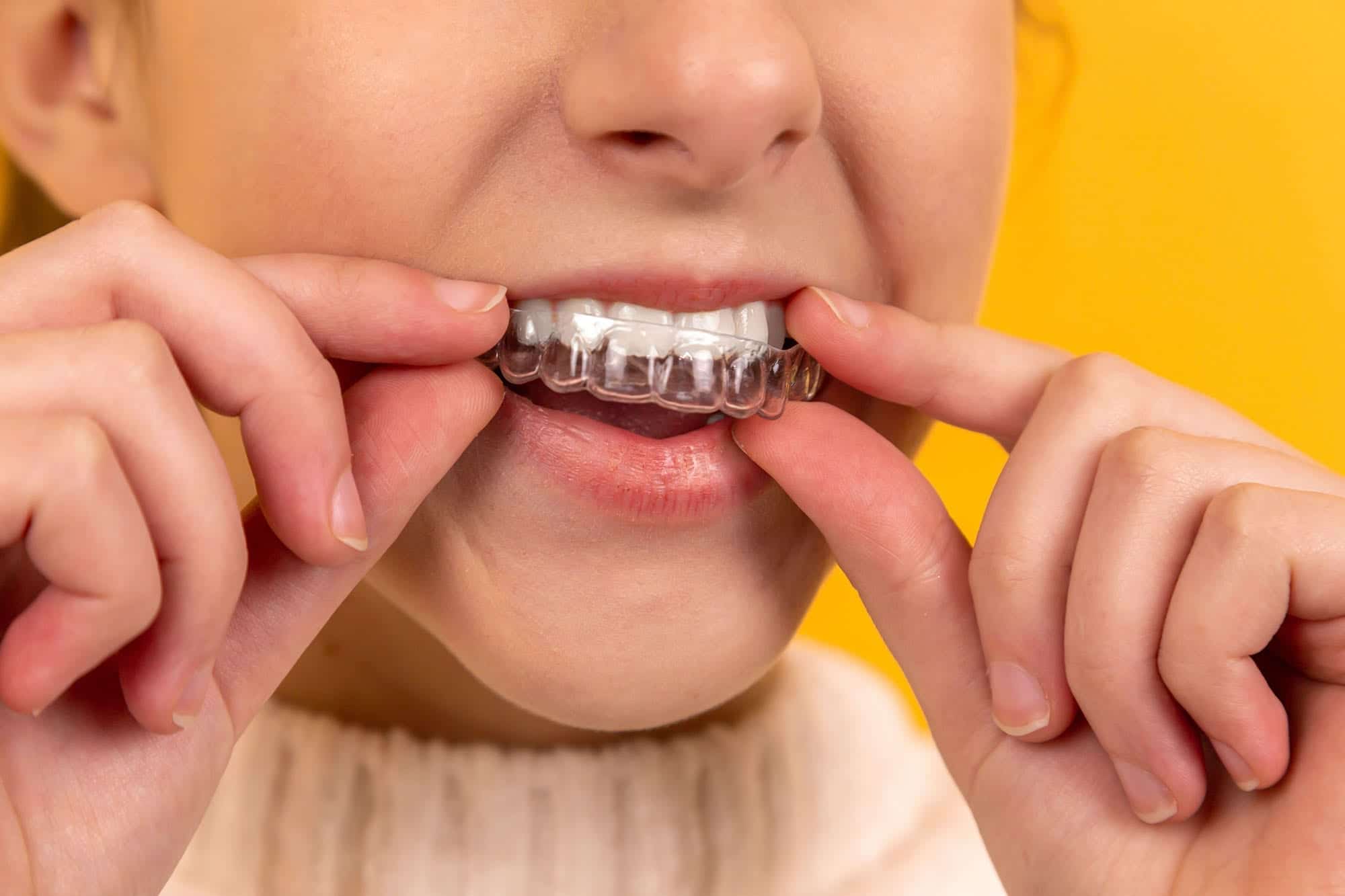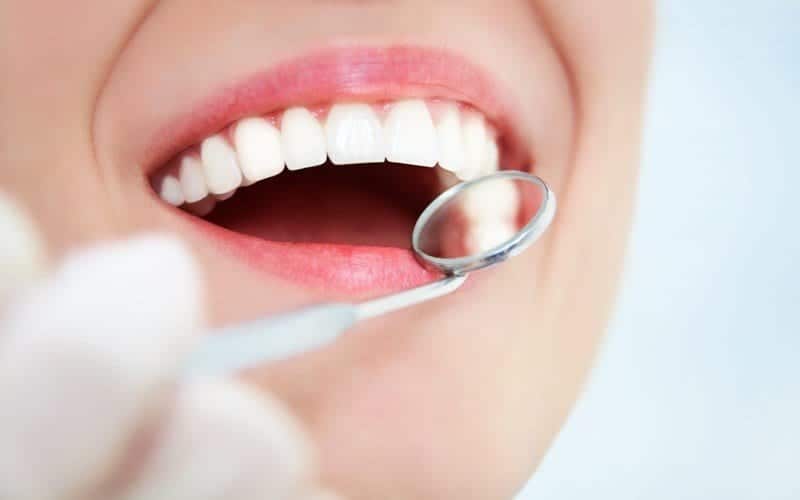Have you heard about the saying “Gain a child, lose a tooth”? This is one of the strange dental superstitions our ancestors had passed on to us as they tried to make sense of occurrences that they did not fully understand. This simply means that pregnant women will often lose a tooth for every child that they have. But how true can this be?
Science proves that this folktale is somehow real. The reason for the tooth loss is that pregnancy prevents calcium absorption and negatively affects a pregnant woman’s bone density. Pregnancy hormones also often lead to bad oral health. This is supported by a study conducted on March 13, 2018 entitled “Women with 2 kids had an average of 4 fewer teeth than moms with 2 children”, which showed how having an additional child could be detrimental to a mother’s oral health.
The common causes of dental health problems during pregnancy are gum problems, vomiting, cravings for sugary foods, and retching while brushing teeth. But pregnant women don’t need to resign themselves to losing teeth: Dental problems can actually be prevented if expectant mothers will observe good oral hygiene, ensure tooth friendly nutrition, and have regular visits to their dentist.
Pregnant women have unique dental issues. Pregnancy causes hormonal changes to a woman’s body that cause gums to swell as well as bleed. These may lead to gingivitis and, eventually, periodontitis. Gingivitis is the inflammation of gums caused by accumulated bacteria on the teeth, while periodontitis is a gum infection that damages the soft tissue and bone supporting the tooth, resulting to a progressive lost of the alveolar bone around the teeth. Pregnant women are exposed to these conditions particularly during the second trimester. About 50 to 70% of women suffer from gingivitis during their pregnancy because too often, with everything else that is going on both within their bodies and outside them, pregnant women overlook their oral health.
If you have cavities or gum disease during your pregnancy, it’s important to ensure good oral routine and set regular appointments with your dentist. Keep in mind that your oral health affects not only your body but the health of your baby as well. Your baby’s health starts with you.
Common Dental Problems during Pregnancy
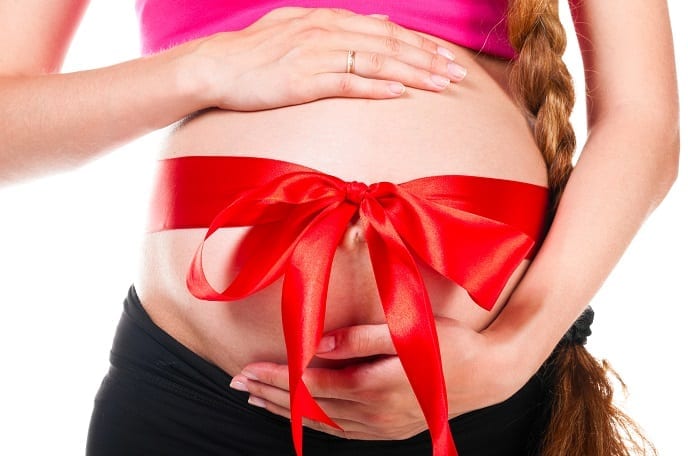
Pregnancy can bring so many changes – including changes in oral health. Here are some of the common conditions faced by expecting mothers.
- The mother’s body responds to bacteria caused by pregnancy gingivitis, resulting to excessive production of prostaglandins. Prostaglandins are hormones that induce labor. Excessive amounts of the hormone may cause premature labor. A baby that is born before term is more prone to health conditions including cerebral palsy and problems with eyesight and hearing. In fact, eighteen out of every 100 premature births may actually be triggered by periodontal disease. Poor oral health habits are also associated with intrauterine growth restriction, gestational diabetes, and preeclampsia.
- Pregnancy increases the risk of tooth decay. Expecting moms may be more prone to cavities because of their more than usual intake of carbohydrates. Morning sickness can also increase the amount of acid their mouth is exposed to, which can destroy their enamel.
- Pregnancy tumors or pregnancy granuloma often appear on the gums during the second trimester of pregnancy. This is a swelling between teeth, which is due to excessive plaque. These pregnancy tumors bleed easily. Luckily, there are ways to remove pregnancy tumors. Just seek advice from your dentist.
- During pregnancy, the ligaments and bones that support teeth loosen, often causing tooth mobility or loose teeth. Some women even find themselves losing a tooth or two just by biting into common foods!
- Too much gastric acid, especially when vomiting, increases the acid inside one’s mouth. These acids erode the tooth enamel. A good remedy for this is to rinse the mouth using a mixture of baking soda and water.
- Eating foods with too much sugar – common among pregnant women because of their cravings – and increased acidity in the mouth can also cause dental caries.
The most common signs of dental problems that a pregnant woman may experience are sore gums, bad breath, loose teeth, mouth sores, and toothache. These signs will help expectant moms prevent dental diseases.
Dental Health Tips for Expectant Moms
Your oral health is an essential part of your general health. The healthier an expectant mom is, the healthier her pregnancy will be, and the healthier her child is likely to be, too. These tips will make sure that your oral health is excellent – thus reducing the risk of gum disease.
- Maintain an oral care routine of brushing and flossing. Brush your teeth for at least two (2) minutes and observe proper brushing techniques. Switch to a softer toothbrush to prevent irritating your gums. Use toothpaste that contains fluoride to protect your teeth against decay. Brushing alone is not enough. You need to floss on a daily basis as this can lower the risk of gum disease. Using antibacterial mouthwash after each meal is important, too. The good oral habits that you will develop during your pregnancy will carry over after the birth and will contribute in your continuous good oral health.
- Do not brush your teeth immediately after vomiting since your teeth are covered with stomach acids. Brushing your teeth will contribute to the erosion of the enamel. Instead, it is advisable to rinse your mouth thoroughly with plain tap water followed by a fluoridated mouthwash. You may use a branded mouth rinse or a mixture of a teaspoon of baking soda and water. Brushing can be done an hour after vomiting.
- When you experience retching while brushing your teeth, you may consider using a toothbrush with a smaller head, similar to toothbrushes made for toddlers. Focus your attention on other things such as listening to music. Also, try using unflavored or bland-tasting toothpaste if morning sickness keeps you from brushing your teeth. Seek advice from your dentist for the brand that best suits your dental needs.
- It is normal for pregnant women to experience food cravings along with food avoidance. Be extra careful of the foods you eat. Speaking of food cravings, remember that intake of sugary snacks and acidic foods can cause tooth decay and damage the enamel of your teeth, exposing you to dental problems. Instead, consciously choose to eat a diet rich with calcium, vitamin B-12, and Vitamin C. Opt for foods with low sugar such as fruits, vegetables, yogurt, and cheese. Note also that expecting mothers’ regular calcium intake is often inadequate during pregnancy. It is advisable to increase your calcium intake to provide the calcium needed by your growing baby. You may do so by consuming more milk, cheese, unsweetened yogurt, and calcium-fortified soymilk, among other calcium-rich foods. Help your body produce more calcium by increasing Vitamin D intake, which can be acquired through sunlight exposure as well as intake of cheese, fortified margarine, fatty fish such as salmon and tuna, and eggs. Being pregnant, you are definitely allowed to crave. Just make sure to know the effects of the foods and drinks you consume – and don’t neglect your dental health.
- During the third trimester, it is advisable to avoid unnecessary dental treatments. Instead, maintain good dental care through regular brushing and flossing. You may set an appointment with your dentist after your baby is born.
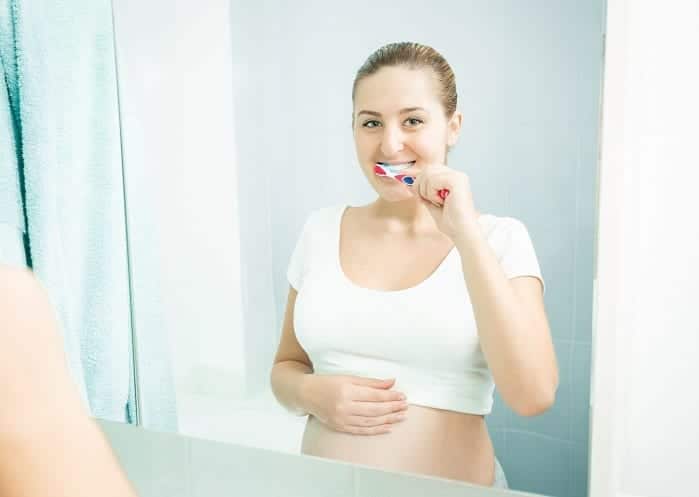
Dental Medications and Procedures for Pregnant Women
Dental hygiene is important for pregnant women so medications and procedures are allowed and can be safely carried out to prevent dental conditions from getting worse. Remember that it is generally recommended to avoid dental treatments during the first trimester since this is the time when your baby is developing his or her vital organs. Treatments are best performed during the second trimester. There will be no harmful effects on the baby if procedures will be conducted during the third trimester but it might be more difficult for the mom to get comfortable in the dental chair as her belly is probably big and heavy by then.
Remember to let your dentist know about your pregnancy and align with your obstetrician for precautions or instructions in case dental procedures need to be done. Be open to your dentist on the prescribed drug names and dosages given by your attending physician so that your dentist can adjust the dental treatment plan based on your specific circumstances.
Here are some of the dental procedures that you can safely undergo while you are pregnant.
- Tooth extraction can be performed during the second trimester. Procedure requirements such as X-rays, antibiotics, and anesthetics are all completely safe. X-rays can cause no harm if performed properly. Usually, pregnant women are advised to wear a leaded apron and thyroid shield to minimize radiation exposure of their abdomen and thyroid gland, respectively. Note that the recommended antibiotics for pregnant women are amoxicillin and penicillin. Other antibiotics need to be avoided as those may stain or discolor your baby’s teeth, which will develop three (3) months into the pregnancy. For anesthetics, lidocaine has been proven as safe during pregnancy. There is a study on the August 2015 issue of the Journal of the American Dental Association, in which expecting mothers have undergone dental procedures that involved anesthetics like lidocaine. No harm was noted during their pregnancies.
- Root canal (a procedure that involves removing the pulp under the infected teeth so it will not affect the periapical region) can also be done during the second trimester.
- If you had braces even before your pregnancy, you are encouraged to have routine check-ups even while expecting. Remember the hormonal changes? These changes might loosen your teeth, which means that your orthodontic treatment plan should be adjusted. Imagine all the discomforts that you will have when you are planning to get braces when you are pregnant – morning sickness, cravings, and many more.
- Performing elective procedures or non-essential dental procedures like teeth bleaching or whitening are encouraged only after the baby is born. However, there is no solid evidence yet that these can be harmful to your baby except for the discomfort that you may experience during the said procedures. If you have your own teeth whitening kit at home, make sure to keep the level of hydrogen peroxide at six (6) percent because higher concentrations may damage your tissues.
Tooth Pain and Gum Bleeding Remedies at Home
- Clove works well as an antiseptic. Many pregnant women experience a toothache, and find that chewing a clove often leads to instant relief. Cloves are also source of iron, which helps in blood formation. It prevents premature labor and low birth weight. It provides vitamin E, which is important in muscle building. It supplies calcium and phosphorus for bone development. It contains antioxidants that make the immune system stronger and provides resistance against infections. It is also useful for the proper growth of your baby as it is a good source of sodium and manganese. It prevents constipation, something that is quite common among pregnant women. It also promotes proper development of your baby’s brain and nervous system. Last but not the least, it contains flavonoids that can ease pregnancy-related aches and pains.
- Pomegranate fights dental plaque. Just take 30ml of pomegranate juice and avoid adding sugar.
- When a woman is pregnant, her gums are more sensitive than usual. Aloe vera can help reduce inflammation, swelling, and bleeding of the gums.
- Tea tree oil is considered as one of the most reliable natural dental treatments. It has anti-inflammatory and antibacterial properties.
- Pregnant women can use garlic as painkillers and natural antibiotics, reducing pain in the infected gum.
- Baking soda serves as a neutralizer for the acids produced by bacteria in the mouth, which often cause toothache and gum infection.
- Chewing neem leaves can prevent fungal and bacterial infections. This also prevents the formation of plaques and bleeding gums.
- Curcumin is one of the components of turmeric. It is helpful in fighting infections and inflammation.
- Coconut helps remove oral toxins. The process called coconut pulling can kill harmful oral bacteria, reduce bad breath, prevent cavities, reduce gum inflammation, improve gum health, and naturally whiten your teeth.
- Milk contains Vitamin K and calcium, and is effective in reducing the discomfort of inflammation and bleeding gums. Just remember to brush your teeth after drinking milk as it can cause plaques to form.
Your Diet Will Affect Your Baby

Your baby’s teeth development will begin between the third and sixth months of pregnancy. Eating well will promote correct formation. Eat foods rich in vitamins A, C, and D, protein, calcium, and phosphorous. To avoid neural tube defects, take 600 mcg of folic acid every day of pregnancy. Drink plenty of water to avoid dry mouth.
Proper dental care means improved pregnancy outcomes and comfort to the expecting mom. Dental medications and procedures do not pose any detrimental effects to the mother and the baby’s health. Good dental care during pregnancy aims to maintain optimal health for you and your baby.
Let’s Create Awareness
It is said that not all pregnant women are aware on how to take care of their oral health. Conducting campaigns on oral health and providing free dental services for the expecting moms will minimize cases of poor oral health.
Thantakit International Dental Center is Thailand’s longest established dental center. Situated in Bangkok, our clinic is renowned across the world as a destination for world-class dentistry, with most of our patients flying to us from Australia. Thantakit offers excellent dental services that are suited to pregnant women, no matter what trimester they are in.
Please contact us today and get a FREE dental consultation.

